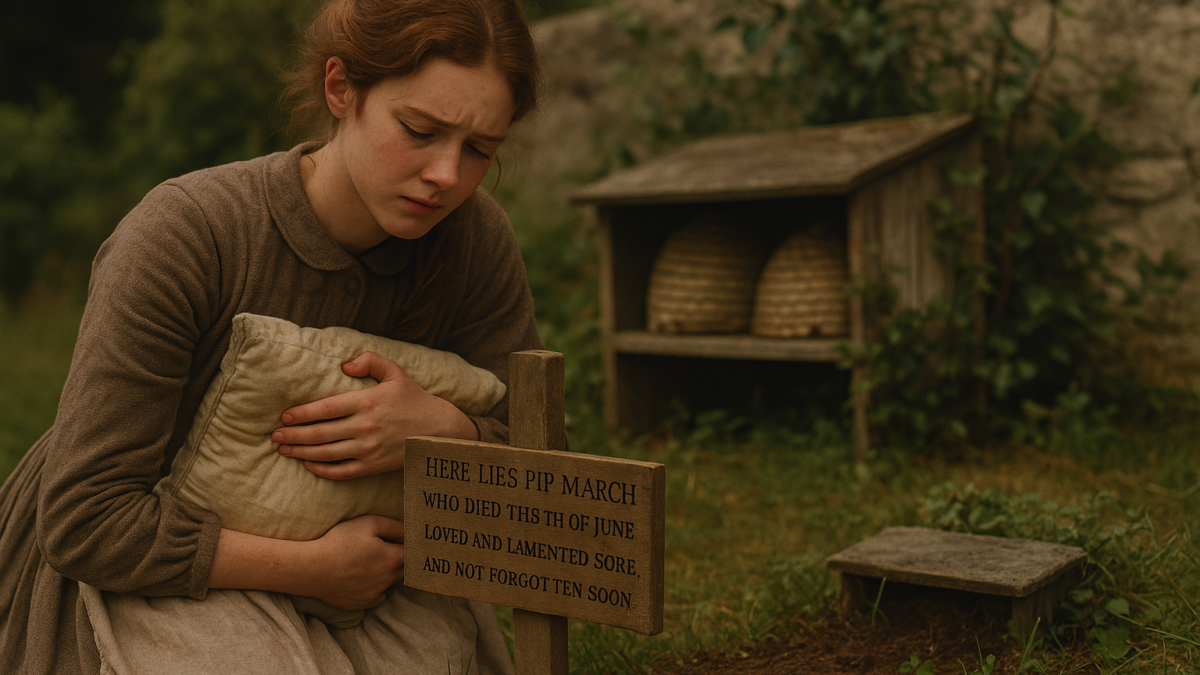『若草物語』英文/和訳【11-5. 経験】
※カラフル対訳で紹介している作品はすべてパブリックドメインです。
このサイトで使われている作品のすべては著作権の切れた名作などの全文を電子化して、インターネット上で公開しているProject Gutenberg(プロジェクト・グーテンベルク)、LibriVox(リブリヴォックス、朗読図書館)の作品を出典としています。
翻訳者:kie_takazawa
Here lies Pip March, Who died the 7th of June;
Loved and lamented sore,[心を痛める]
And not forgotten soon.
6月7日死去――ピップマーチここに眠る。
愛され、嘆き悲しまれ、
長く我らの心にとどまる[すぐには忘れられはしまい]。
At the conclusion[終結, 結び] of the ceremonies,[儀式,式典] Beth retired to her room, overcome with[~に圧倒される、~にやられる] emotion[感情,情緒] and lobster,
お葬式が終わると、ベスは悲しい気持ちと夕食のロブスターに参ってしまい自分の部屋に引きこもってしまった。
but there was no place of repose, for the beds were not made, and she found her grief[深い悲しみ] much assuaged[緩和する] by beating up[強くうちのめす] the pillows and putting things in order.
ベッドはきちんと整えられてはいなかったので、気が休まる場所が見つからなかったが、枕を叩き、物を整理するうちに悲しみが和らぐのが分かった。
Meg helped Jo clear away[(食後に)片づける] the remains[残り] of the feast,[饗宴] which took half the afternoon and left them so tired that they agreed to be contented with tea and toast for supper.[昼食をディナーとした場合の比較的軽い夕食]
メグはジョーが宴会の残骸を片付けるのを手伝うことで、午後の半分を費やしてしまい、疲れてしまった。彼女たちは夕食にお茶とトーストで満足することに賛成した。
Laurie took Amy to drive, which was a deed[行為] of charity, for the sour cream seemed to have had a bad effect upon[悪い影響を与えた] her temper.
ローリーはエイミーを馬車に乗せてドライブに出かけた。それは慈善事業だった。酸っぱくなったクリームでエイミーの機嫌が良くなかったからだ。
Mrs. March came home to find the three older girls hard at work in the middle of the afternoon,
マーチ夫人が家に帰ってみると、上の3人の娘たちが午後の中ごろから一生懸命働いているのがわかり、
and a glance at the closet gave her an idea of[(人)に~がどのようなものであるか知らせる] the success of one part of the experiment.
クローゼットをちらりと見て、この試み[経験]の一部がうまくいったことが分かった。
Before the housewives could rest, several people called, and there was a scramble to get ready to see[~に目配りする] them.
三人の主婦たちは休憩する間も無く、何人かの人が尋ねてきて、来客の世話をするための準備に大慌てだった。
Then tea must be got, errands done, and one or two necessary bits of sewing neglected[おろそかにする] until the last minute.
その後、お茶の支度をしたり、お使いを済ませたりしなければいけなかったので、1つ2つやっておかなければならないちょっとした裁縫もあったが、最後までほったらかしにしておかなければならなかった。
As twilight fell, dewy and still, one by one they gathered on the porch[建物・教会などで外に張り出した屋根付きの玄関] where the June roses were budding[芽を出しかけた] beautifully,
日が暮れて、夜露が降り静まり返る頃、六月のバラが美しいつぼみを付けているポーチに一人また一人と集まってきて、
and each groaned or sighed as she sat down, as if tired or troubled.
疲れたのと大変だったのとで、姉妹たちは呻いたりため息をついたりしながら座った。
“What a dreadful day this has been!” began Jo, usually the first to speak.
「なんてひどい一日だったんだろう」とジョーが言い始めた、たいてい最初に口を開くのは彼女なのだ。
“It has seemed shorter than usual, but so uncomfortable,”[不愉快な] said Meg.
「いつもより短く感じたけれど、やっかいな日だったわね」とメグ。
“Not a bit like home,” added Amy.
「いつものお家とはぜんぜん違ったわ」とエイミーは付け加えた。
“It can’t seem so without Marmee[Mommy] and little Pip,” sighed Beth, glancing with full eyes at the empty cage[鳥かご] above her head.
「お母さまと小さなピップがいないんだもの、お家のようじゃないわ」とベスはため息をつき、涙で目をいっぱいにして頭上の空のカゴをちらりと眺めた。
“Here’s Mother, dear, and you shall have another bird tomorrow, if you want it.”
「お母さまはここよ、ベス。もしあなたが欲しいのなら、明日違う小鳥を買ってもいいのよ」
As she spoke, Mrs. March came and took her place among them, looking as if her holiday had not been much pleasanter than theirs.
そう言いながらマーチ夫人はやって来てみんなの仲間入りした。どうやらお母さまの休日もみんなの休日と同様にあまり楽しくなかったかのようだった。
“Are you satisfied with your experiment, girls, or do you want another week of it?” she asked,
「みんな、(遊んでばかりで働かない生活の)経験に満足したかしら?それとも、もう1週間続けたいのかしら?」とマーチ夫人は尋ねた。
as Beth nestled up to her and the rest turned toward her with brightening[~を輝かせる] faces, as flowers turn toward the sun.
まずベスがお母さまに寄り添い、他の姉妹たちも花々が太陽の方に向くように、晴れ晴れとしたような顔つきでお母さまの方を向いた。
“I don’t!” cried Jo decidedly.
「もうこりごりよ!」とジョーは断言した。
“Nor I,” echoed the others.
「私も!」と他の三人の声がこだました。
“You think then, that it is better to have a few duties[義務,やらなければならない事] and live a little for others, do you?”
「それではあなたたちは、いくつかのお仕事をしたり、ちょっぴり他の人のために何かした[生きた]りして暮らす方が良いということかしら?」
“Lounging and larking doesn’t pay,”[割にあわない] observed Jo, shaking her head.
「ぶらぶらして、ふざけ【る】ていてもいい事ないわ」とジョーは首を振りながら言った。
“I’m tired of it and mean to go to work[仕事をしに行く] at something right off.”
「もう、うんざりだから、すぐにでも何か取り掛かるつもりよ」
“Suppose you learn plain cooking.
「簡単な料理を習うといいわね。
That’s a useful accomplishment,[特技,教養] which no woman should be without,” said Mrs. March, laughing inaudibly[聞こえないように] at the recollection of[~を思い出して] Jo’s dinner party,
とても役に立つたしなみよ、女性には欠かせないものですからね」 とマーチ夫人言った。夫人は、ジョーの晩餐会を思い出して声を出さないように笑った。
for she had met Miss Crocker and heard her account of it.
というのもマーチ夫人はミス・クロッカーに会って、事の顛末を聞いていたからだ。
“Mother, did you go away and let everything be, just to see how we’d get on?”[仕事などを進める] cried Meg, who had had suspicions all day.
「お母さまは、私たちがどうするか見ようと思って、(わざと)すべてを放ってお出かけになったの?」と、一日中疑っていたメグは大きな声で尋ねた。
“Yes, I wanted you to see how the comfort of all depends on[~次第である] each doing her share[割り当て,負担] faithfully.[誠実に]
「そうよ、みんなが快適に過ごすには、ひとりひとりが自分の役割を忠実に果たすことにかかっている、ということを知ってもらいたかったのです。
While Hannah and I did your work, you got on pretty well, though I don’t think you were very happy or amiable.
ハンナと私があなた達の仕事をしてあげているときは、あなた達はとても上手くいっていたでしょう。けれど、あなた達はそれがとても幸せなことで心地よいことだと分かっているようには見えなかったわ。
So I thought, as a little lesson, I would show you what happens when everyone thinks only of herself.
だから、ちょっとした教訓として、みんなが自分のことしか考えていないとどうなるかを教えてあげようと思ったのよ。
Don’t you feel that it is pleasanter to help one another, to have daily duties which make leisure sweet when it comes,
お互いが助け合い、日々の仕事をこなしていくことで、(家庭は)ますます快適なものになりますし、暇な時間ができたとき、それを心から楽しむことができるんじゃないかしら。
and to bear and forbear, that home may be comfortable and lovely to us all?”
じっと我慢することで、家庭がみんなにとって快適で素敵なものになっていくと思わない?」
“We do, Mother, we do!” cried the girls.
「そう思うわ!お母さま」四姉妹は叫んだ。
“Then let me advise you to take up[取り上げる, 手に取る] your little burdens again, for though they seem heavy sometimes, they are good for us, and lighten as we learn to carry them.[運ぶことを学ぶにつれて]
「それなら、もう一度あなた達の小さな重荷を背負うようにアドバイスしましょう。ときには重く思えるかもしれませんが、それは私たちのためになり、慣れてくるにつれて軽くなっていくのですよ。
Work is wholesome,[健康によい] and there is plenty for everyone.
仕事をするという事は健全ですし、どんな人にだって仕事はたくさんあるものです。
It keeps us from[人に~させないようにする] ennui and mischief, is good for health and spirits, and gives us a sense of power and independence better than money or fashion.”
働いていれば、退屈することや悪い事をすることもないし、身体の健康や精神にも良いものす。それにお金や流行などよりも力強さや独立心を与えてくれるのよ」
“We’ll work like bees,[ミツバチ] and love it too, see if[〜かどうか確かめる] we don’t,” said Jo.
「私たち蜂のように働いて、働く事を好きになるわ、見てて」とジョーは言った。
“I’ll learn plain[平易な, 簡単な] cooking for my holiday task, and the next dinner party I have shall be a success.”
「お休みのあいだの課題として簡単な料理を習うわ、そして次のディナーは成功させてみせるの」
“I’ll make the set of shirts for father, instead of letting you do it, Marmee[Mommy].
「私はお父さまのためにシャツ一式を作るわ、お母さまに任せきりにさせないわ。
I can and I will, though I’m not fond of sewing.
できるもの、やってみるわ。裁縫は好きじゃないけれどね。
That will be better than fussing over[こだわる,やきもきする] my own things, which are plenty nice enough as they are.” said Meg.
自分のものばかりに気を揉むよりいいものね。私はもう十分たくさん良いものがあるんだもの」とメグが言った。
“I’ll do my lessons every day, and not spend so much time with my music and dolls.
「私は毎日お勉強して、音楽や人形にあまり時間をかけないようにするわ。
I am a stupid thing,[愚かな] and ought to be studying, not playing,” was Beth’s resolution,
私はバカだから、遊んでいないで勉強しなくちゃ」とベスは決意し、
while Amy followed their example by heroically declaring, “I shall learn to make buttonholes, and attend to[専心する,取り掛かる] my parts of speech.”
エイミーはみんなにならって「ボタン穴を作ったり、品詞を覚えたりするわ」と勇ましく宣言した。
“Very good! Then I am quite satisfied with the experiment, and fancy that[~だと思う] we shall not have to repeat it, only don’t go to the other extreme and delve[掘り下げる] like slaves.
「よかったわ!これで、お母さまは今回のみんなの経験に満足することができます。こんな経験を繰り返す必要はないと思うけれど、今度は反対の極端に走って、奴隷のようにやり過ぎないでちょうだいね。
Have regular hours for work and play, make each day both useful and pleasant,
仕事と遊びの時間を決めて、毎日を有意義で楽しいものにして、
and prove that you understand the worth of time by employing[用いる,使用する] it well.
時間をうまく使うことで、時間の価値を理解していることを証明するんですよ。
Then youth will be delightful, old age will bring few regrets, and life become a beautiful success, in spite of poverty.”
そうすれば、青春は楽しく、老後は悔いの少ないものになり、貧しくても人生は美しいものとなりますよ」
“We’ll remember, Mother!” and they did.
「私たち忘れないわ、お母さま!」それからも姉妹たちはその事を忘れなかった。

